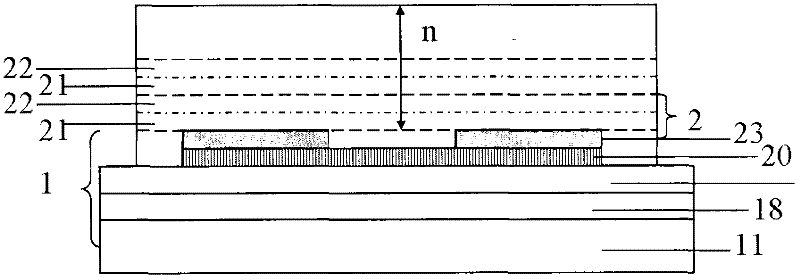A method for encapsulating an optoelectronic device
A technology for optoelectronic devices and packaging methods, applied in the field of optoelectronics, can solve the problems of device performance degradation, stability degradation, and formation of black spots, and achieve the effects of extending device life, simplifying processes, and improving device stability.
- Summary
- Abstract
- Description
- Claims
- Application Information
AI Technical Summary
Problems solved by technology
Method used
Image
Examples
Embodiment 1
[0028] Such as figure 1 As shown, 1 is an organic electroluminescent device, the anode layer 12 is ITO, and the hole transport layer 13 is N, N'-bis(naphthylidene-1-yl)-N,N'-bis(phenyl) - benzidine (NPB), electron transport layer 14 is 1,3,5-(tri-N-phenyl-2-benzimidazole-2) benzene 41 (TPBi), cathode layer 15 is Mg:Ag alloy, inorganic thin film Packaging material layer 21 is Al 2 o 3 , UV-curable resin 22 includes 55% epoxidized octadecyl-conjugated triene-9,11,13-acid triglyceride, 4% glycerol, 0.98% lead oxide, 5% toluene di Isocyanate, 8% trimethylol propane, 0.01% hydroquinone, 12% tetrahydrofuran, 6% 2-hydroxyethyl methacrylate, 0.01% dibutyltin dilaurate, 1% 2, 2-dimethoxy-phenyl ketone and 8% methyl methacrylate, the number of cycles n is 20, the device structure is:
[0029] Glass substrate / ITO / NPB(50nm) / TPBi(30nm) / Mg:Ag(200nm) / [Al 2 o 3 (200nm) / UV curable resin (100nm)] 20
[0030] The preparation method is as follows:
[0031] ①Use detergent, acetone solutio...
Embodiment 2
[0039] Such as figure 1 As shown, 1 is an organic electroluminescent device, the anode layer 12 is ITO, and the hole transport layer 13 is N, N'-bis(naphthylidene-1-yl)-N,N'-bis(phenyl) - benzidine (NPB), electron transport layer 14 is 1,3,5-(tri-N-phenyl-2-benzimidazole-2) benzene 41 (TPBi), cathode layer 15 is Mg:Ag alloy, inorganic thin film Packaging material layer 21 is Al 2 o 3, UV-curable resin 22 includes 55% epoxidized octadecyl-conjugated triene-9,11,13-acid triglyceride, 4% glycerol, 0.01% lead oxide, 5% toluene di Isocyanate, 8% trimethylol propane, 0.989% hydroquinone, 12% tetrahydrofuran, 6% 2-hydroxyethyl methacrylate, 0.01% dibutyltin dilaurate, 1% 2, 2-dimethoxy-phenyl ketone and 8% methyl methacrylate, the number of cycles n is 16, the device structure is:
[0040] Glass substrate / ITO / NPB(50nm) / TPBi(30nm) / Mg:Ag(200nm) / [Al 2 o 3 (200nm) / UV curable resin (100nm)] 16
[0041] The preparation method is similar to Example 1.
Embodiment 3
[0043] Such as figure 1 As shown, 1 is an organic electroluminescent device, the anode layer 12 is ITO, and the hole transport layer 13 is N, N'-bis(naphthylidene-1-yl)-N,N'-bis(phenyl) - benzidine (NPB), electron transport layer 14 is 1,3,5-(tri-N-phenyl-2-benzimidazole-2) benzene 41 (TPBi), cathode layer 15 is Mg:Ag alloy, inorganic thin film Packaging material layer 21 is Al 2 o 3 , UV-curable resin 22 includes 30% epoxidized octadecaconjugated triene-9,11,13-acid triglyceride, 5% glycerol, 1% lead oxide, 7% toluene di Isocyanate, 10% trimethylol propane, 1% hydroquinone, 15% tetrahydrofuran, 10% 2-hydroxyethyl methacrylate, 1% dibutyltin dilaurate, 8% 2, 2-dimethoxy-phenyl ketone and 12% methyl methacrylate, the number of cycles n is 12, and the device structure is:
[0044] Glass substrate / ITO / NPB(50nm) / TPBi(30nm) / Mg:Ag(200nm) / [Al 2 o 3 (200nm) / UV curable resin (100nm)] 12
[0045] The preparation method is similar to Example 1.
PUM
 Login to View More
Login to View More Abstract
Description
Claims
Application Information
 Login to View More
Login to View More - R&D
- Intellectual Property
- Life Sciences
- Materials
- Tech Scout
- Unparalleled Data Quality
- Higher Quality Content
- 60% Fewer Hallucinations
Browse by: Latest US Patents, China's latest patents, Technical Efficacy Thesaurus, Application Domain, Technology Topic, Popular Technical Reports.
© 2025 PatSnap. All rights reserved.Legal|Privacy policy|Modern Slavery Act Transparency Statement|Sitemap|About US| Contact US: help@patsnap.com



